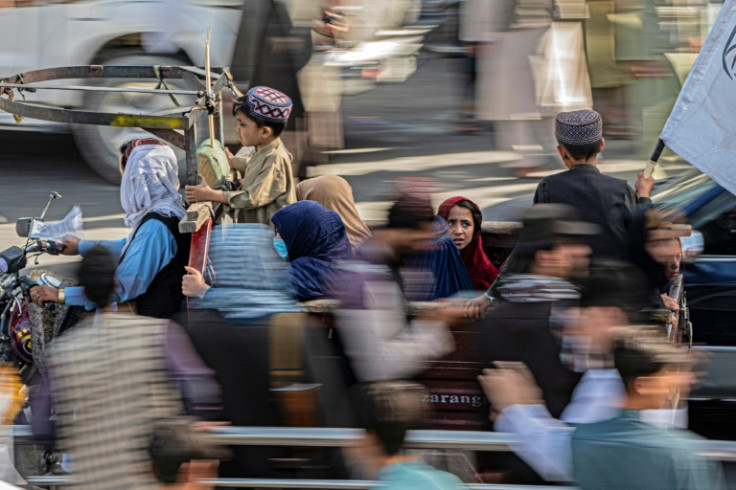Women continue to face discrimination in Afghanistan two years into Taliban rule
The Taliban barred girls from attending secondary schools on September 18, 2021, a month after it took over Afghanistan.

It has been two years since the day the Taliban shut down schools to stop Afghan girls from getting an education.
The restrictions began with the promise that the school closures were temporary and that girls would eventually be allowed to resume their studies, but that did not happen.
The Taliban barred girls from attending secondary schools on September 18, 2021, a month after they took over Afghanistan. The ban on higher education was announced in December of last year.
The regime had initially promised that it would reopen the schools for girls beyond the sixth grade, but it backtracked on its decision just hours before the schools were set to open last year.
Several videos of female students crying in front of their schools then made the rounds on social media. One of the videos shows a student breaking down on the floor when the school did not allow her in.
But the cries fell on deaf ears, and the Taliban continued to attack women's rights to education, work, and freedom of movement.
How it all began?
After the initial ban on secondary education, the women were also banned from attending senior secondary and higher secondary schools. The ban was later extended to classes in universities, and from working in government and private offices.
According to UN Women, more than 50 orders and restrictions targeting women and young girls have been implemented in the country. UN Secretary-General António Guterres has urged the Taliban to let the women "back in school".
Two years ago, on this very day, the Taliban closed girls' schools in Afghanistan, taking away their basic right to education. As of 2023, Afghanistan is the only country where girls are not allowed to go to school, work, or even have their own identity.
— Shabnam Khan Dawran🇦🇫 (@shabnamdawran) September 18, 2023
The reason the Taliban… pic.twitter.com/2BoYzgO5L6
"This is an unjustifiable violation of human rights that inflicts long-lasting damage on the entire country," Antonio Guterres said in a Twitter (now X) post.
"Girls belong in school. Let them back in," he added. The UN Global Fund for Education in Emergencies and Protracted Crises has claimed that 2.5 million girls are currently out of school.
The Taliban have waged a war against women. They had taken the same approach in the 1990s as well. During its rule in the 1990s, women were not allowed to get an education or step outside without a male chaperone.
A UN report on the situation of human rights in Afghanistan revealed that women continue to face "restrictions in their movement, attire, employment options, and ability to seek public office or perform the public role".
On the 2nd anniversary of closure of schools to girls in Afghanistan by Taliban, students say that Taliban have 'burried their dreams alive', adding that 'Taliban have an enmity with women's education and progress.' pic.twitter.com/Thnq8v8kCf
— SHRW (@ShirinHrw) September 18, 2023
After the takeover of Afghanistan in August 2021, the Taliban promised they would respect the rights of women "within the limits of Islam." It seems the Taliban's interpretation of Islam can never be favourable to women.
Human rights activists, journalists, and Afghan citizens who managed to flee the country after the Taliban's takeover have also been urging the world to come to their aid, but to no avail.
The United Nations has labelled the Taliban's actions in Afghanistan as "gender-based apartheid." It has urged governments across the world to make "gender apartheid" an international crime.
Shaharzad Akbar, the former head of the Afghanistan Independent Human Rights Commission, recently said that the Taliban have "turned Afghanistan into a mass graveyard of Afghan women and girls' ambitions, dreams, and potential."
The Afghan authorities have also banned women from visiting parks, gyms, and public baths. They have also reportedly banned the sale of contraceptives in Kabul and Mazar-i-Sharif. This step could lead to an increase in maternal mortality rates and unwanted pregnancies.
In fact, they have adopted a unique strategy to implement all these restrictions. They insist that a certain restriction will be put in place on a temporary basis. However, that restriction is never really removed.
The Taliban promised a softer approach but has been taking steps to gradually eliminate women from public life and spaces. Women are being systematically targeted by the regime in Afghanistan.
Women face harsh punishment if they violate any of the restrictions imposed by the government. The Western nations, the UN, and human rights organisations have all failed to hold the regime accountable for human rights violations. Statements are issued condemning every ban, but the statements are never followed by actions. The people of Afghanistan, in particular, continue to wait in vain.
© Copyright IBTimes 2025. All rights reserved.






















